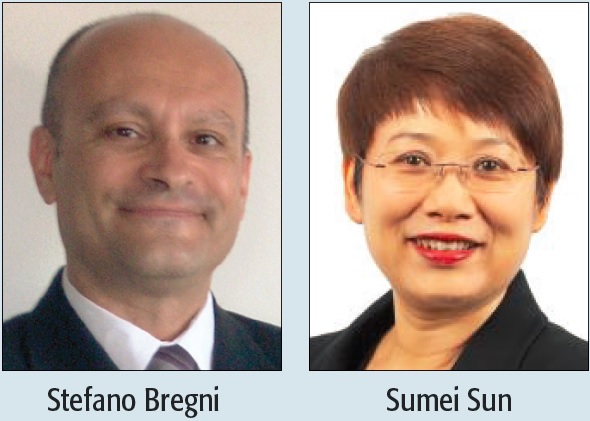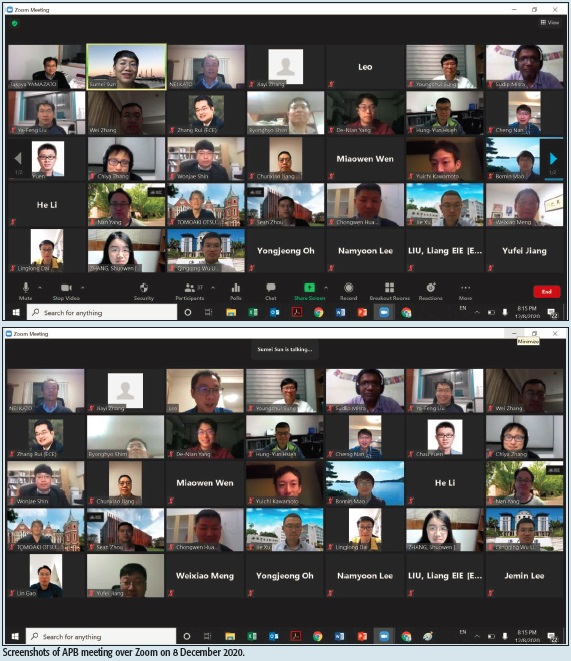
This is the fifth article in the series of eight, started in December 2020 and published monthly in the IEEE ComSoc Global Communications Newsletter, which covers all areas of IEEE ComSoc Member and Global Activities.
In this series of articles, I introduce the Vice-President and six Directors on the Member and Global Activities Council (namely: Sister and Related Societies; Membership Services; AP, NA, LA, EMEA Regions) and the two Chairs of the Women in Communications Engineering (WICE) and Young Professionals (YP) Standing Committees. In each article, one by one they present their sector activities and plans.
In this issue, I interview Sumei Sun, Director of the Asia Pacific (AP) Region.
Sumei is a principal scientist and head of the Communications and Networks Department at the Institute for Infocomm Research (I2R), Singapore. She is also holding a joint appointment with the Singapore Institute of Technology, and an adjunct appointment with the National University of Singapore, both as a full professor. Her current research interests are in cognitive communications and networks, next-generation wireless communications, and Industrial Internet of Things. She served on the editorial board of IEEE Wireless Communications Letters, IEEE Transactions on Vehicular Technology, IEEE Communications Surveys & Tutorials, and is now Editor-in-Chief of IEEE Open Journal of Vehicular Technology, Steering Committee member of IEEE Transactions on Wireless Communications, and a Distinguished Speaker (2018-2021) of the IEEE Vehicular Technology Society. She is an IEEE Fellow.
Sumei has been actively involved in the IEEE Communications Society (ComSoc) Asia Pacific Board (APB) and has been the APB director since January 2020. Starting from January 2021, she is also serving as a member at large with IEEE ComSoc.
Personally, I observed her terrific organizational skills on the committee of GLOBECOM 2017, Singapore. I have also appreciated her as one of the most active and meticulous members of the GIMS Committee. I feel very honored to interview her for this issue.
Stefano: Hello Sumei! We might begin our interview by outlining the main characteristics of the AP Region.
Sumei: The Asia Pacific region, also known as Region 10 in IEEE, is the largest region in number of members and geographic area. It is also the fastest growing Region. More than a quarter of all IEEE members are from the AP region and there are more than 10,000 ComSoc members in our region. The Region is coordinated and served by the Asia Pacific Board and the local chapters, with strong support from the ComSoc leadership and staff. The APB has built a strong tradition to provide a great platform and serve the needs of AP regional members and communications industries, facilitate all AP members to share information, promote cooperation between academia and industry, and encourage professional activities.
I am joined by three vice directors to work closely with five committees in the APB, covering various aspects of membership development and membership services. They are: Chapters Coordination Committee (CCC), Information Services Committee (ISC), Meetings and Conference Committee (MCC), Membership Development Committee (MDC), and Technical Affairs Committee (TAC). We support and coordinate the distinguished lecture and speaker events, publish regular newsletters, and organize two annual awards, the ComSoc Asia Pacific Young Researcher Award and the Asia Pacific Outstanding Paper Award.
The AP Region has been very active in organizing and hosting ComSoc conferences, e.g., the ComSoc flagship conference Globecom 2020, successfully held in Taipei last December, is one of them. ICC2022 will be coming to Seoul, Korea, and Globecom 2023 to Kuala Lumpur, Malaysia.
Stefano: The Distinguished Lecturer Program (DLP) and the Distinguished Speaker Program (DSP) are particularly appreciated by our Members. During my previous term as VP for Member Relations, we increased the budget allocated to these programs, in order to allow more and better DLTs in all Regions. What is your perception of these Programs? How are they organized in the AP Region?
Sumei: 2020 was a challenging year. Since early 2020 we have been experiencing the COVID-19 pandemic. The pandemic has been causing many challenges with devastating impacts, including the DLP and DSP. We have also been brought closer through many virtual platforms and webinars.
To continue serving our members and to remain updated with the latest communications research in the new normal, we have worked with ComSoc and implemented the virtual distinguished lecture (vDL) program. In 2020, two in-person DLs and 19 vDLs have been hosted by the AP region.
Our member engagement efforts and services have led to a significant membership increase of more than 10 percent in the AP region compared with 2019, the highest increase among the 10 regions in ComSoc. We have also welcomed a few new chapters/joint chapters in 2020 in the AP region.
Stefano: The Asia Pacific Board (APB) assigns Awards to recognize the achievements of AP members. Please discuss those Awards in some detail.
Sumei: The APB recognizes the outstanding achievements of the AP members with two annual awards, the ComSoc Asia Pacific Young Researcher Award and the Asia Pacific Outstanding Paper Award. Both awards are highly recognized and have been successfully organized, with the 15th Young Researcher Award and 9th Best Paper Award in 2020.
The two awards are organized by the Technical Affairs Committee (TAC), coordinated by the Vice Director in charge of the TAC. For 2020-2021, Ling-Yang Song and Hung-Yun Hsieh are the TAC Co-Chairs, Chan-Byoung Chae and Tony Quek are the Vice-Chairs, and Wei Zhang is the APB Vice Director-in-Charge. The recipients are selected from the submitted nominations received from the annual open calls.
In 2020, we revised the selection process for both awards to promote better diversity and transparency. Specifically, in the open call, the evaluation criteria are clearly stated, and the evaluation committees’ members are listed. We also improved diversity in geographic, gender, and research topics in the composition of the evaluation committees. We will continue improving the diversity in the committee and the award recipients, for example, by increasing the participation from the industry members.
Stefano: What are the major challenges that you currently see in the AP Region?
Sumei: The AP Region is a very vibrant region. We have been seeing exciting growth in membership, contributions in research publications and conference organization. With the ongoing 5G deployment and the kickoff of 6G research, we also see a lot of new potential in the AP Region. So moving forward, we will work with the ComSoc leadership and local chapters to continue organizing more relevant activities to serve our members, and grow our community. Another challenge we hope to address is to promote and increase the visibility and presence of AP members in leadership roles in ComSoc.
Stefano: Besides those AP Board Members who you have mentioned already, would you like to acknowledge the contribution of any other in particular?
Sumei: In addition to the APB officers, I would like to take the opportunity to specially thank Prof. Vincent Chan, ComSoC President; Prof. Nei Kato, ComSoc Vice President for Member and Geographic Activities (MGA); Ricardo Veiga, ComSoc Director of the Member Services Board; Prof. Saewoong Bahk, APB Past Director; and the APB Advisors, for their guidance and support, and the ComSoc staff for their support. Last but not least, I’d also like to thank Hwa Chiang Leo and Ewell Tan from the IEEE Singapore Operations office for their support to the APB.
Stefano: Definitely! Hwa Chiang and Ewell provide exceptional support to ComSoc and IEEE activities in the AP Region. Ewell, in particular, is a pillar for the Global Communications Newsletter, for her sustained and reliable effort to solicit and select contributions from AP Chapters.
To conclude our interview, what will be the highlight of 2021, among the many activities that you are running?
Sumei: In 2021, we will continue to serve our members in the new normal with online DLTs/DSPs and webinars. We will also set up new initiatives to better serve our student members, woman members, and industry members. Stay tuned!
